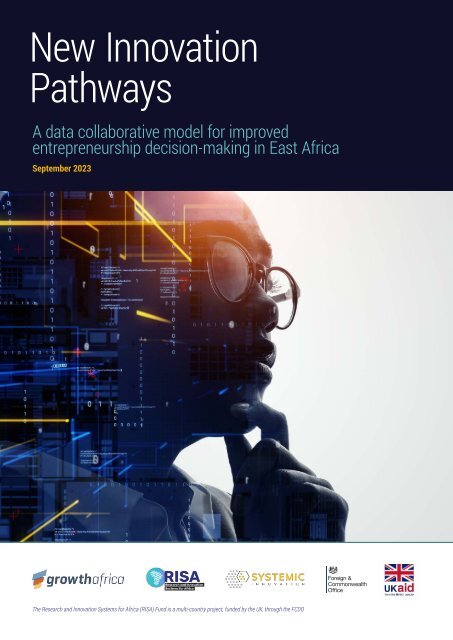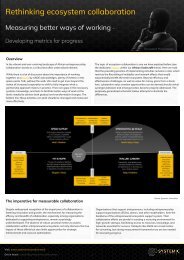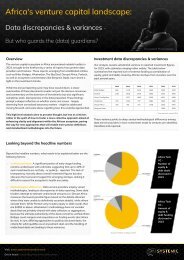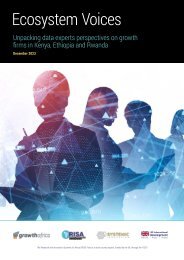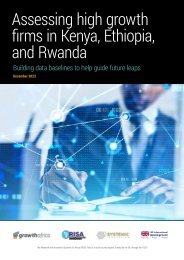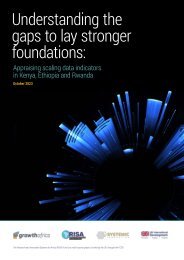New Innovation Pathways. A data collaborative model for improved entrepreneurship decision making in East Africa.
In this insight report, we shed light on the crucial need and value of a data collaborative model within the East African entrepreneurial ecosystems. With a specific focus on Kenya, Rwanda and Ethiopia, we present a compelling case for a stronger evidence base, discuss the timely nature of this endeavour, and underscore the advantages associated with enhanced data coordination and improved ecosystem cohesion.
In this insight report, we shed light on the crucial need and value of a data collaborative model within the East African entrepreneurial ecosystems. With a specific focus on Kenya, Rwanda and Ethiopia, we present a compelling case for a stronger evidence base, discuss the timely nature of this endeavour, and underscore the advantages associated with enhanced data coordination and improved ecosystem cohesion.
You also want an ePaper? Increase the reach of your titles
YUMPU automatically turns print PDFs into web optimized ePapers that Google loves.
<strong>New</strong> <strong>Innovation</strong><br />
<strong>Pathways</strong><br />
A <strong>data</strong> <strong>collaborative</strong> <strong>model</strong> <strong>for</strong> <strong>improved</strong><br />
<strong>entrepreneurship</strong> <strong>decision</strong>-<strong>mak<strong>in</strong>g</strong> <strong>in</strong> <strong>East</strong> <strong>Africa</strong><br />
September 2023<br />
The Research and <strong>Innovation</strong> Systems <strong>for</strong> <strong>Africa</strong> (RISA) Fund is a multi-country project, funded by the UK, through the FCDO
PG. 2<br />
<strong>New</strong> <strong>in</strong>novation<br />
pathways<br />
Insight report<br />
No. 1<br />
Contents<br />
Scal<strong>in</strong>g firms and their significance 3<br />
The significance of <strong>data</strong> 3<br />
Understand<strong>in</strong>g entrepreneurial ecosystems 3<br />
Demands <strong>for</strong> systemic solutions 4<br />
Def<strong>in</strong><strong>in</strong>g <strong>data</strong> collaboration 5<br />
Untapped potential of <strong>data</strong> shar<strong>in</strong>g 6<br />
The timel<strong>in</strong>ess of a “<strong>New</strong> Deal on Data” <strong>in</strong> <strong>Africa</strong> 7<br />
The way <strong>for</strong>ward: Active systems collaboration 8<br />
This <strong>in</strong>sight report is the first of a series produced<br />
by Growth<strong>Africa</strong> and Systemic <strong>Innovation</strong> under a<br />
FCDO-funded Research and <strong>Innovation</strong> Systems <strong>for</strong><br />
<strong>Africa</strong> (RISA) Fund project to conceptualise, design<br />
and launch a scalable and replicable <strong>model</strong> <strong>for</strong> a<br />
<strong>data</strong> observatory <strong>for</strong> scal<strong>in</strong>g commercial ventures<br />
<strong>in</strong> Kenya, Ethiopia and Rwanda.<br />
In this <strong>in</strong>sight report, we shed light on the crucial need and<br />
value of a <strong>data</strong> <strong>collaborative</strong> <strong>model</strong> with<strong>in</strong> the <strong>East</strong> <strong>Africa</strong>n<br />
entrepreneurial ecosystems. With a specific focus on Kenya,<br />
Rwanda and Ethiopia, we present a compell<strong>in</strong>g case <strong>for</strong> a<br />
stronger evidence base, discuss the timely nature of this<br />
endeavour, and underscore the advantages associated with<br />
enhanced <strong>data</strong> coord<strong>in</strong>ation and <strong>improved</strong> ecosystem cohesion.
PG. 3<br />
<strong>New</strong> <strong>in</strong>novation<br />
pathways<br />
Insight report<br />
No. 1<br />
Scal<strong>in</strong>g firms and their significance<br />
Extensive evidence <strong>in</strong>dicates that scal<strong>in</strong>g ventures play a pivotal role <strong>in</strong> <strong>mak<strong>in</strong>g</strong> substantial<br />
impacts <strong>in</strong> terms of employment generation, talent capacity, and overall socio-economic value<br />
creation. We draw <strong>in</strong>sights from our research report, “Scal<strong>in</strong>g <strong>in</strong> <strong>Africa</strong>,” which extensively<br />
explores the trans<strong>for</strong>mative effects of scal<strong>in</strong>g bus<strong>in</strong>esses.<br />
Numerous studies have demonstrated that scal<strong>in</strong>g enterprises significantly contribute to<br />
<strong>in</strong>novation, social change, and the enhancement of national competitiveness. However, despite<br />
their paramount importance, little attention has been given to understand<strong>in</strong>g and analys<strong>in</strong>g the<br />
growth and decl<strong>in</strong>e patterns of <strong>Africa</strong>n ventures.<br />
We strongly contend that delv<strong>in</strong>g deeper <strong>in</strong>to the <strong>in</strong>tricacies of the scal<strong>in</strong>g process has the<br />
potential to yield <strong>in</strong>valuable <strong>in</strong>sights <strong>in</strong>to how ventures operat<strong>in</strong>g <strong>in</strong> resource-constra<strong>in</strong>ed<br />
conditions, fac<strong>in</strong>g fragmented market environments and pervasive <strong>in</strong><strong>for</strong>mal economies—such<br />
as those found <strong>in</strong> Kenya, Ethiopia, and Rwanda—manage to grow aga<strong>in</strong>st all odds and achieve<br />
medium- to large-sized operations, as well as expand <strong>in</strong>ternationally.<br />
The significance of <strong>data</strong><br />
Data fundamentally serves as an enabler—a core currency <strong>for</strong> re<strong>in</strong><strong>for</strong>c<strong>in</strong>g research and<br />
<strong>in</strong>novation ecosystems—but only when it is effectively understood and applied.<br />
Un<strong>for</strong>tunately, there is a dearth of <strong>for</strong>mal quantitative research <strong>in</strong>vestigat<strong>in</strong>g the factors that<br />
contribute to scale <strong>in</strong> <strong>East</strong> <strong>Africa</strong>, and <strong>Africa</strong> <strong>in</strong> general. Exist<strong>in</strong>g <strong>data</strong> often takes a prescriptive<br />
approach, primarily report<strong>in</strong>g essential market <strong>in</strong><strong>for</strong>mation and deal flow. Mistakenly, this <strong>data</strong><br />
is sometimes considered evidence of <strong>in</strong>novation. Private <strong>data</strong> service providers predom<strong>in</strong>antly<br />
measure <strong>in</strong>vestments rather than high growth itself.<br />
Consequently, high growth and <strong>in</strong>vestment <strong>data</strong> have become synonymous, represent<strong>in</strong>g<br />
a shallow level of analysis. Although there are correlations between raised fund<strong>in</strong>g and the<br />
potential to build teams, develop products, and implement go-to-market strategies, revenue<br />
<strong>data</strong> is generally unavailable, direct employment <strong>data</strong> is patchy, and social impact metrics are<br />
entirely absent.<br />
The metrics related to scalability, organisational health, and specific firm capability dynamics<br />
are often overlooked. Consequently, firm-level benchmark<strong>in</strong>g <strong>data</strong> has been <strong>for</strong>gotten, <strong>mak<strong>in</strong>g</strong><br />
it <strong>in</strong>credibly challeng<strong>in</strong>g to derive a consistent set of underly<strong>in</strong>g features of high-growth firms<br />
across different sett<strong>in</strong>gs.<br />
Moreover, there is limited consensus and alignment between <strong>data</strong> service providers regard<strong>in</strong>g<br />
def<strong>in</strong>itions and sector categorisations, h<strong>in</strong>der<strong>in</strong>g accurate comparative assessments. We also<br />
recognise that specific <strong>in</strong>dicators are far more important <strong>for</strong> high-growth firms compared to<br />
their startup counterparts. For <strong>in</strong>stance, specialist <strong>in</strong>dustry knowledge, mentor<strong>in</strong>g, partnerships,<br />
and expertise <strong>in</strong> <strong>in</strong>ternational expansion play a critical role. However, these elements often<br />
receive <strong>in</strong>adequate attention.<br />
Understand<strong>in</strong>g entrepreneurial ecosystems<br />
The concept of entrepreneurial ecosystems is rooted <strong>in</strong> the understand<strong>in</strong>g that entrepreneurs<br />
and firms are <strong>in</strong>tricately <strong>in</strong>terconnected with their surround<strong>in</strong>g environments. The range of<br />
environmental metrics and <strong>in</strong>dicators is extensive. There are considerable methodological<br />
differences <strong>in</strong> assess<strong>in</strong>g how well an ecosystem per<strong>for</strong>ms.<br />
Entrepreneurship support organisations (ESOs) are ideally positioned to gather and utilise <strong>data</strong><br />
to support high-growth ventures, as they provide direct support through programme design and<br />
tailored services to cater to unique needs. Un<strong>for</strong>tunately, many ESOs face limitations <strong>in</strong> their<br />
monitor<strong>in</strong>g and evaluation processes, often due to <strong>in</strong>sufficient resources allocated by donors.
PG. 4<br />
<strong>New</strong> <strong>in</strong>novation<br />
pathways<br />
Insight report<br />
No. 1<br />
Thankfully, <strong>data</strong>-driven technological advancements facilitated by organisations such as Village<br />
Capital, ANDE, C4G and Impact Foresight have resulted <strong>in</strong> <strong>improved</strong> diagnostic tools becom<strong>in</strong>g<br />
available. The benefits would be immense if some of these <strong>in</strong>sights were pooled together<br />
and shared widely, rather than be<strong>in</strong>g held <strong>in</strong> isolated silos. It is essential to capture positive<br />
externalities, particularly where public fund<strong>in</strong>g generates private value.<br />
Demands <strong>for</strong> systemic solutions<br />
Data fatigue with<strong>in</strong> the ecosystem:<br />
A pervasive and omnipresent issue <strong>in</strong> the ecosystem is stakeholder fatigue result<strong>in</strong>g from<br />
cont<strong>in</strong>ual and exploitative <strong>data</strong> requests. The overwhelm<strong>in</strong>g number of requests <strong>for</strong> <strong>data</strong>,<br />
surveys, <strong>in</strong>terviews, workshops, and the repetition of <strong>data</strong> collection ef<strong>for</strong>ts contribute to a<br />
sense of malaise with<strong>in</strong> the ecosystem. There is a concern<strong>in</strong>g frequency of requests <strong>for</strong> the<br />
same <strong>data</strong> from different researchers, which can lead to dysfunctionality.<br />
Less extractive approaches:<br />
Data is often provided without clear visibility <strong>in</strong>to its utilisation, lead<strong>in</strong>g to frustrations and<br />
eroded trust. Partnerships, particularly when there is a power imbalance, often result <strong>in</strong> the<br />
more powerful party - often <strong>for</strong>eign - extract<strong>in</strong>g greater value than the local counterpart. To<br />
discourage fund<strong>in</strong>g projects that are extractive <strong>in</strong> design, any <strong>data</strong> collected as a result of<br />
donor-funded projects should be anonymised, <strong>in</strong>cluded <strong>in</strong> <strong>data</strong> repositories with the prior<br />
<strong>in</strong><strong>for</strong>med consent of the <strong>data</strong> owners, and made available <strong>for</strong> controlled utilisation. This<br />
approach ensures that ventures’ time and resources are not wasted.<br />
Ecosystem imbalances:<br />
An evident disequilibrium exists between the actors who have access to <strong>data</strong> (<strong>in</strong>vestors,<br />
development f<strong>in</strong>ance <strong>in</strong>stitutions, donors) and those who do not (ecosystem support actors,<br />
catalysts, entrepreneurs). This imbalance leads to <strong>in</strong>efficiencies, duplication, and wastage.<br />
Donors can work more <strong>collaborative</strong>ly, adopt<strong>in</strong>g <strong>improved</strong> ways of work<strong>in</strong>g and coherence<br />
strategies that can be passed on to their implement<strong>in</strong>g partners as a condition of fund<strong>in</strong>g.<br />
Partnerships need to be relational, long-term, and provide fair value to all <strong>in</strong>volved, regardless of<br />
whether the value is tangible or <strong>in</strong>tangible.<br />
Normalisation of <strong>data</strong> usage:<br />
Research commissioned by the UK Government’s Foreign, Commonwealth & Development<br />
Office (FCDO) <strong>in</strong>dicates that neither the government nor the bus<strong>in</strong>ess community habitually<br />
uses research <strong>data</strong>. Many ecosystem actors rely more on <strong>in</strong>st<strong>in</strong>ctive “gut-feel” approaches<br />
rather than evidence-driven <strong>decision</strong>-<strong>mak<strong>in</strong>g</strong>. Collect<strong>in</strong>g and analys<strong>in</strong>g <strong>in</strong>dustry <strong>data</strong><br />
systematically and consistently can help identify best practices and successful growth<br />
strategies. Attitudes towards <strong>data</strong> often lean towards competition and proprietary ownership,<br />
rather than collaboration, as seen <strong>in</strong> more mature markets.<br />
Lack of common taxonomies:<br />
The absence of a common <strong>data</strong> language and term<strong>in</strong>ology hampers effective ecosystem<br />
alignment. Establish<strong>in</strong>g a shared understand<strong>in</strong>g would facilitate better collaboration and<br />
coord<strong>in</strong>ation.<br />
Critical <strong>in</strong>frastructure requirements:<br />
There is a notable lack of open <strong>data</strong> structures, mechanics, and processes, limit<strong>in</strong>g<br />
opportunities to make <strong>data</strong> more accessible. Previous FCDO country research reports have<br />
acknowledged the need to establish research <strong>data</strong> <strong>in</strong>frastructure (e.g. <strong>in</strong> Rwanda) and to<br />
strengthen the role of national <strong>in</strong>termediaries <strong>in</strong> bridg<strong>in</strong>g the gap between research and<br />
policymakers (e.g. <strong>in</strong> Ethiopia and Kenya).
PG. 5<br />
<strong>New</strong> <strong>in</strong>novation<br />
pathways<br />
Insight report<br />
No. 1<br />
In<strong>for</strong>mation silos and <strong>in</strong><strong>for</strong>mation asymmetries persist, result<strong>in</strong>g <strong>in</strong> isolated <strong>data</strong> that receives<br />
<strong>in</strong>adequate attention. Consequently, <strong>in</strong>sights <strong>in</strong>to specific factors enabl<strong>in</strong>g scale and ef<strong>for</strong>ts to<br />
support potential scale-ups rema<strong>in</strong> limited and less effective than desired.<br />
Data hoard<strong>in</strong>g is also prevalent, with limited access, unwill<strong>in</strong>gness to release <strong>data</strong>, and a<br />
perceived value <strong>in</strong> reta<strong>in</strong><strong>in</strong>g rather than shar<strong>in</strong>g it. It is evident that there are <strong>data</strong> capacity<br />
challenges throughout the ecosystem.<br />
While there may be an appetite <strong>for</strong> us<strong>in</strong>g <strong>data</strong> to <strong>in</strong><strong>for</strong>m <strong>decision</strong>-<strong>mak<strong>in</strong>g</strong>, people often lack the<br />
capacity to analyse <strong>data</strong>, especially from non-traditional sources. Upskill<strong>in</strong>g and simplify<strong>in</strong>g<br />
knowledge about the use and application of different <strong>data</strong> sources among key <strong>in</strong>novation<br />
<strong>in</strong>frastructure audiences is essential.<br />
“An ecosystem <strong>data</strong> strategy could improve the availability and<br />
quality of <strong>data</strong> on <strong>entrepreneurship</strong> activities and ecosystem-build<strong>in</strong>g<br />
<strong>in</strong>itiatives. Establish<strong>in</strong>g <strong>data</strong> collection mechanisms, partnerships with<br />
academic <strong>in</strong>stitutions, and collaboration with the private sector are all<br />
promis<strong>in</strong>g approaches to strengthen<strong>in</strong>g this support”.<br />
Source: ANDE Phase Knowledge Brief: Lessons from Three Years of Ecosystem Build<strong>in</strong>g Report<br />
Def<strong>in</strong><strong>in</strong>g <strong>data</strong> collaboration<br />
A new approach - <strong>data</strong> <strong>collaborative</strong>s:<br />
A <strong>data</strong> <strong>collaborative</strong> represents a relatively new <strong>for</strong>m of collaboration that br<strong>in</strong>gs together<br />
public-private partnerships. These collaborations allow participants from different fields -<br />
<strong>in</strong>clud<strong>in</strong>g private companies, research <strong>in</strong>stitutions, and government agencies - to exchange<br />
<strong>data</strong> <strong>in</strong> order to solve public problems.<br />
Collaboration with <strong>data</strong> can take various <strong>for</strong>ms, rang<strong>in</strong>g from creat<strong>in</strong>g, process<strong>in</strong>g and<br />
analys<strong>in</strong>g <strong>data</strong> through <strong>in</strong>terdiscipl<strong>in</strong>ary teams and groups, to shar<strong>in</strong>g <strong>data</strong>, receiv<strong>in</strong>g feedback,<br />
and discuss<strong>in</strong>g it. It also <strong>in</strong>volves the reuse of <strong>data</strong> <strong>in</strong> new contexts.<br />
A central aspect of <strong>data</strong> collaboration is the establishment of a dedicated plat<strong>for</strong>m or <strong>data</strong><br />
observatory. This plat<strong>for</strong>m serves as a facility that provides access to various <strong>data</strong> sources and<br />
tools <strong>for</strong> <strong>data</strong> analysis. With sufficient <strong>in</strong>vestment, the observatory can also offer tra<strong>in</strong><strong>in</strong>g and<br />
support to help users understand and effectively utilise the <strong>data</strong>.<br />
Additionally, it can act as a <strong>for</strong>um <strong>for</strong> entrepreneurs and ecosystem stakeholders to share<br />
<strong>in</strong><strong>for</strong>mation, knowledge, and collaborate on solutions to common challenges.<br />
Who benefits from <strong>data</strong> collaboration?<br />
At a high level, <strong>data</strong> collaboration offers numerous advantages:<br />
• <strong>New</strong> <strong>in</strong>sights: By diversify<strong>in</strong>g and <strong>in</strong>creas<strong>in</strong>g the amount of <strong>in</strong><strong>for</strong>mation available,<br />
researchers can uncover new <strong>in</strong>sights and ga<strong>in</strong> a deeper understand<strong>in</strong>g of the<br />
<strong>entrepreneurship</strong> ecosystem.<br />
• Faster, more accurate <strong>decision</strong>-<strong>mak<strong>in</strong>g</strong>: Data collaboration provides stakeholders with a<br />
more complete and accurate picture of complex issues, enabl<strong>in</strong>g faster and more <strong>in</strong><strong>for</strong>med<br />
<strong>decision</strong>-<strong>mak<strong>in</strong>g</strong>.<br />
• Improved <strong>for</strong>ecast<strong>in</strong>g accuracy: By analys<strong>in</strong>g disparate and <strong>in</strong>terconnected <strong>data</strong> sources<br />
us<strong>in</strong>g advanced <strong>data</strong> analytics, stakeholders can identify new drivers <strong>for</strong> more accurate<br />
<strong>for</strong>ecasts.
PG. 6<br />
<strong>New</strong> <strong>in</strong>novation<br />
pathways<br />
Insight report<br />
No. 1<br />
• Process efficiency and coord<strong>in</strong>ation: Additional <strong>in</strong>sights from new <strong>data</strong> sources can<br />
optimise processes, reduce <strong>in</strong>efficiencies, and enhance day-to-day operations with<strong>in</strong> the<br />
ecosystem.<br />
• Increased <strong>in</strong>novation: Data collaboration enables stakeholders to identify new sources<br />
of value, lead<strong>in</strong>g to the development of new product offer<strong>in</strong>gs and <strong>in</strong>novative bus<strong>in</strong>ess<br />
<strong>model</strong>s <strong>in</strong> collaboration with other stakeholders, foster<strong>in</strong>g areas of shared value.<br />
Data collaboration <strong>in</strong>itiative exemplars<br />
Notable examples of <strong>data</strong> collaboration <strong>in</strong>itiatives co-funded by the government and<br />
philanthropic organisations exist. For <strong>in</strong>stance, the <strong>data</strong> vacc<strong>in</strong>e CoLab, born out of<br />
COVIDAction, has been established to support <strong>data</strong>-driven <strong>decision</strong>-<strong>mak<strong>in</strong>g</strong> <strong>in</strong> global<br />
partnerships to address specific challenges. Its core focus is on provid<strong>in</strong>g actionable <strong>in</strong>sights<br />
derived from <strong>data</strong>. This year it is fund<strong>in</strong>g 7 grantees look<strong>in</strong>g at <strong>data</strong> policy and governance to<br />
enable better <strong>data</strong> shar<strong>in</strong>g and <strong>in</strong>teroperability, <strong>decision</strong>-<strong>mak<strong>in</strong>g</strong> tools such as mach<strong>in</strong>e-learn<strong>in</strong>g<br />
powered dashboards and geospatial maps of under-vacc<strong>in</strong>ated populations and related social<br />
determ<strong>in</strong>ants, and capacity development to equip local actors on the ground to action <strong>in</strong>sight<br />
and develop targeted vacc<strong>in</strong>e programmes. The aim is to capture learn<strong>in</strong>g and evidence on a<br />
portfolio-approach and see how <strong>in</strong>terventions support one another and contribute to a bigger,<br />
more strategic picture.<br />
Facilitation &<br />
Delivery<br />
A core group which<br />
coord<strong>in</strong>ates and<br />
directs support<br />
strategically<br />
Vacc<strong>in</strong>e<br />
Data CoLab<br />
The CO<br />
A diverse group of<br />
global and national<br />
implementers,<br />
policy-makers,<br />
funders, and<br />
researchers work<strong>in</strong>g<br />
to use hyperlocal<br />
<strong>data</strong> systems <strong>for</strong><br />
vacc<strong>in</strong>e <strong>decision</strong><br />
<strong>mak<strong>in</strong>g</strong><br />
The LAB<br />
Grant fund<strong>in</strong>g a diverse portfolio of<br />
<strong>in</strong>terventions across country-led priorities<br />
Learn more here: https://www.<strong>mak<strong>in</strong>g</strong>betterfutures.org/aboutvdcl<br />
Tech Nation <strong>data</strong> commons<br />
In the U.K Tech Nation developed a <strong>data</strong> commons which provided a 360-degree view of the<br />
rapidly evolv<strong>in</strong>g <strong>in</strong>novation economy. It <strong>in</strong>cludes detailed <strong>in</strong><strong>for</strong>mation on <strong>in</strong>dividual technology<br />
bus<strong>in</strong>esses, founders, <strong>in</strong>vestors, VC funds, angels, accelerators, universities and service<br />
providers to the sector. Openness was key to the effectiveness of the project with the plat<strong>for</strong>m<br />
provid<strong>in</strong>g a secure space that allows members of the tech community to pool <strong>in</strong><strong>for</strong>mation<br />
that will benefit the wider community. In addition to analytics and other <strong>data</strong> provided by <strong>data</strong><br />
service providers, the <strong>data</strong>base was enhanced by a broad range of third party submitted and<br />
user-generated content. All users were <strong>in</strong>vited and encouraged to upload relevant <strong>in</strong><strong>for</strong>mation,<br />
so that an already rich well of <strong>data</strong> grew organically, provid<strong>in</strong>g an accurate picture of trends and<br />
activity with<strong>in</strong> the tech startup scene.
PG. 7<br />
<strong>New</strong> <strong>in</strong>novation<br />
pathways<br />
Insight report<br />
No. 1<br />
Untapped potential of <strong>data</strong> shar<strong>in</strong>g<br />
There is significant untapped value <strong>in</strong> <strong>data</strong> shar<strong>in</strong>g among private and public actors <strong>for</strong> the<br />
collective benefits of the entrepreneurial ecosystem, <strong>in</strong>clud<strong>in</strong>g:<br />
Enhanced understand<strong>in</strong>g <strong>for</strong> ventures:<br />
Greater <strong>in</strong>sight <strong>in</strong>to the growth patterns of ventures and the identification of universal and<br />
contextually-<strong>in</strong>fluenced scal<strong>in</strong>g factors can benefit ventures <strong>in</strong> their growth journey.<br />
Improved support by ecosystem catalysts:<br />
Ecosystem catalysts, often funded by donors, would greatly benefit from a deeper<br />
understand<strong>in</strong>g of growth dynamics. This knowledge would enable them to provide more tailored<br />
and effective support services to facilitate scal<strong>in</strong>g.<br />
Targeted government <strong>in</strong>terventions:<br />
Government <strong>in</strong>terventions, such as support and fund<strong>in</strong>g programs, can become more specific<br />
and targeted by leverag<strong>in</strong>g <strong>in</strong>sights from <strong>data</strong> collaboration. This approach would enhance<br />
project delivery efficiency, reduce asymmetries, wastage, and lead to evidence-based policy<br />
changes.<br />
Foster<strong>in</strong>g a culture of collaboration and learn<strong>in</strong>g:<br />
Data collaboration promotes mean<strong>in</strong>gful conversations, knowledge shar<strong>in</strong>g, and the<br />
dissem<strong>in</strong>ation of best practices. This <strong>collaborative</strong> approach nurtures an ecosystem where<br />
stakeholders work together to address challenges and drive collective action.<br />
The timel<strong>in</strong>ess of a “<strong>New</strong> Deal on Data”<br />
<strong>in</strong> <strong>Africa</strong><br />
The current landscape<br />
presents an opportune<br />
moment <strong>for</strong> a “<strong>New</strong> Deal on<br />
Data” <strong>in</strong> <strong>Africa</strong>. Important<br />
ef<strong>for</strong>ts are already underway<br />
to advance open <strong>data</strong> policies<br />
and governance frameworks<br />
across the cont<strong>in</strong>ent.<br />
Vehicles<br />
A “<strong>New</strong> Deal”<br />
Observatory<br />
Contours<br />
Initiatives by the <strong>Africa</strong>n<br />
Union, the <strong>Africa</strong>n Economic<br />
Research Consortium<br />
and other organisations<br />
emphasise the potential<br />
of <strong>data</strong> to drive <strong>in</strong>novation,<br />
societal value, and evidencebased<br />
policy<strong>mak<strong>in</strong>g</strong>. These<br />
ef<strong>for</strong>ts highlight the need to<br />
maximise <strong>data</strong> utilisation,<br />
foster cross-border <strong>data</strong><br />
flows while protect<strong>in</strong>g<br />
<strong>in</strong>dividual rights, and bridge<br />
the gap between <strong>data</strong><br />
production and policy<strong>mak<strong>in</strong>g</strong>.<br />
Responsible<br />
Data<br />
Stewardship<br />
Framework<br />
Purpose-<br />
Led<br />
A NEW DEAL<br />
ON DATA<br />
People-<br />
Led<br />
“<strong>New</strong> Deal”<br />
Investment<br />
Practice-<br />
Led<br />
A Community-<br />
Led Plat<strong>for</strong>m<br />
Learn more here: https://open<strong>data</strong>policylab.org
PG. 8<br />
<strong>New</strong> <strong>in</strong>novation<br />
pathways<br />
Insight report<br />
No. 1<br />
Catch<strong>in</strong>g the wave<br />
In Kenya, the Kenyan National <strong>Innovation</strong> Agency is work<strong>in</strong>g on a strategic ‘Masterplan’ which<br />
is <strong>in</strong>tended to be “aspirational, educational and <strong>in</strong><strong>for</strong>mative, offer<strong>in</strong>g a shared vision to align<br />
actors across the wider ecosystem”. It will be launched <strong>in</strong> December 2023.<br />
In Ethiopia, the Entrepreneurship Development Institute is work<strong>in</strong>g on a national ecosystem<br />
strategy.<br />
In Rwanda, projects have been <strong>in</strong>stigated by the World Bank, Mastercard Foundation, and by<br />
the Rwanda Government which cover <strong>data</strong> driven support <strong>for</strong> ESOs and the broader <strong>in</strong>novation<br />
ecosystem.<br />
The way <strong>for</strong>ward:<br />
Active systems collaboration<br />
Collaboration has been identified as the “secret sauce” <strong>for</strong> startups and <strong>in</strong>dustries,<br />
surpass<strong>in</strong>g acquisitions and build<strong>in</strong>g from scratch. A <strong>collaborative</strong> approach, facilitated by<br />
<strong>data</strong> <strong>collaborative</strong>s, can create a community of practice compris<strong>in</strong>g parties and <strong>in</strong>novation<br />
ecosystem <strong>data</strong> experts with shared <strong>data</strong> <strong>in</strong>terests.<br />
By actively participat<strong>in</strong>g <strong>in</strong> the systems design process, stakeholders can collectively create<br />
representative and <strong>in</strong>clusive collaboration <strong>model</strong>s. This approach allows <strong>for</strong> the shar<strong>in</strong>g of<br />
ideas, experiences, and best practices, driv<strong>in</strong>g <strong>in</strong>novation and establish<strong>in</strong>g a robust evidence<br />
base.<br />
Furthermore, comb<strong>in</strong><strong>in</strong>g diverse <strong>data</strong>sets and conduct<strong>in</strong>g comprehensive analyses enables a<br />
deeper understand<strong>in</strong>g of the relationships between micro and macro variables. By harness<strong>in</strong>g<br />
<strong>data</strong> <strong>collaborative</strong>s, stakeholders can uncover valuable trend <strong>in</strong>sights and establish clearer<br />
evidence bases, enhanc<strong>in</strong>g the effectiveness of <strong>decision</strong>-<strong>mak<strong>in</strong>g</strong> and policy <strong>in</strong>terventions.<br />
Implement<strong>in</strong>g a <strong>data</strong> <strong>collaborative</strong> <strong>model</strong> <strong>in</strong> <strong>East</strong> <strong>Africa</strong>’s <strong>entrepreneurship</strong> ecosystem holds<br />
immense potential. By leverag<strong>in</strong>g the power of <strong>data</strong> and foster<strong>in</strong>g collaboration among<br />
stakeholders, it is possible to overcome challenges, drive <strong>in</strong>novation, and build a stronger<br />
and more <strong>in</strong>clusive ecosystem. Recognis<strong>in</strong>g the value of <strong>data</strong> coord<strong>in</strong>ation and establish<strong>in</strong>g<br />
a foundation <strong>for</strong> collective action will empower <strong>East</strong> <strong>Africa</strong> to thrive <strong>in</strong> the dynamic world of<br />
<strong>entrepreneurship</strong>.<br />
For further <strong>in</strong><strong>for</strong>mation, please contact us at contact@systemic<strong>in</strong>novation.work<br />
To learn more about the RISA Fund visit https://www.risa-fund.org


